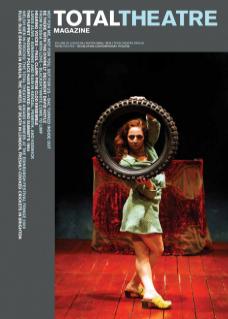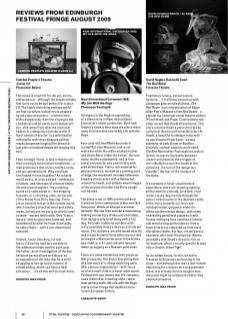The venue is a tight fit for the set, actors, and audience – although the claustrophobic feel turns out to be just perfect for Icarus 2.0. The highly disturbing onstage world we find ourselves locked into is peopled by only two characters – a father (who shifts dangerously from the cloying to the combative) and an eerily naive pubescent son, shut away from what we are led to believe is a dangerous outside world. A third ‘absent character’ is a wife/mother referred to with terse disapproval that masks desperate longing (the father) or just plain unmasked desperate longing (the son).
Their onstage ‘home’ is less a theatre set than a lovingly constructed installation – a mad professor’s den of jars, bottles, tools, and accumulated junk. Why are these two locked in here together? An outside world exists, or once existed – evidenced in letters, and mentions of a former family life and a lost daughter. The crackling sound of a radio seeps in – the shipping forecast, or a straining, slow-mo version of the theme from Dirty Dancing. There are occasional forays to the outside world, which involve protective wear and safety ropes, but we are not party to what is seen outside – we are held inside. Only ‘Icarus’ leaves, returning bruised, battered, and bewildered by what he finds. Eventually, he takes flight… with a pre-determined outcome.
Intense, funny, shocking, surreal… Icarus 2.0 can be read as a parable of the adolescent male need to push past the father; as an investigation of the line between parental love and abuse; as an exposition of the idea that for a child struggling to live up to the memory of a dead sibling, death can have a fatal attraction… it’s all this and so much more.

